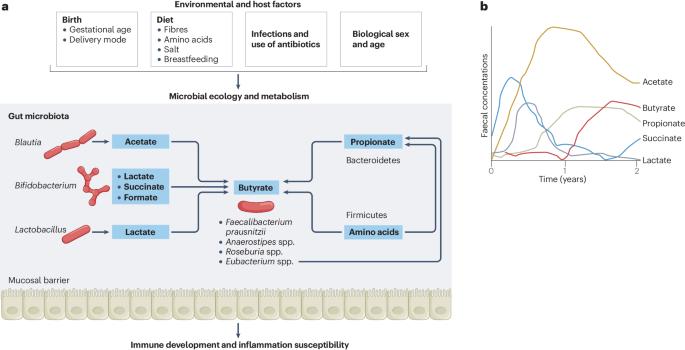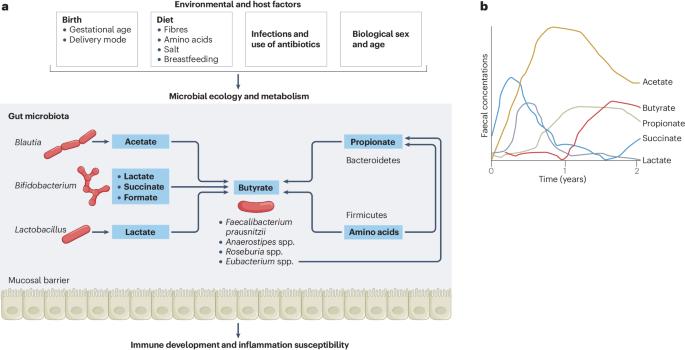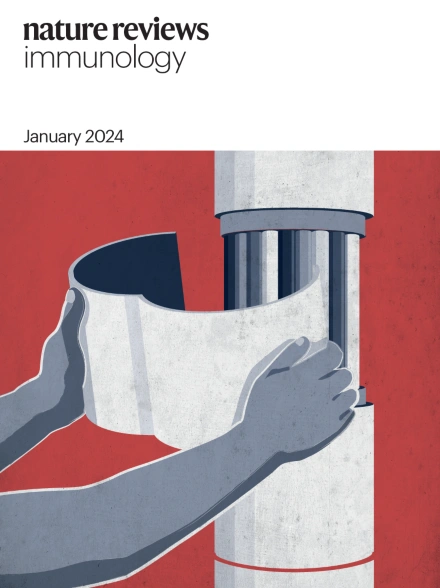短链脂肪酸:将饮食、微生物群和免疫力联系起来
IF 67.7
1区 医学
Q1 IMMUNOLOGY
引用次数: 0
摘要
短链脂肪酸(SCFAs)丁酸盐、丙酸盐和乙酸盐是微生物的代谢产物,它们在肠道和其他器官中的供应量取决于环境因素,如饮食和抗生素的使用,这些因素影响着微生物群的多样性和新陈代谢。SCFAs 通过涉及 G 蛋白偶联受体信号或组蛋白去乙酰化酶活性的进化保守过程来调节上皮屏障功能以及粘膜和全身免疫。有迹象表明,丁酸盐的抗炎作用是通过直接影响肠上皮细胞、吞噬细胞、B 细胞和浆细胞以及调节性和效应 T 细胞的分化来实现的。肠道衍生的 SCFAs 还直接或间接影响肠道外部位的免疫,如肝脏、肺、生殖道和大脑,并与一系列疾病有关,包括感染、肠道炎症、自身免疫、食物过敏、哮喘和对癌症疗法的反应。从生态学角度了解微生物群落及其相互关联的新陈代谢状态,以及丁酸菌工程学,可能有助于采取以 SCFA 为重点的干预措施,预防和治疗免疫介导的疾病。本文章由计算机程序翻译,如有差异,请以英文原文为准。


Short-chain fatty acids: linking diet, the microbiome and immunity
The short-chain fatty acids (SCFAs) butyrate, propionate and acetate are microbial metabolites and their availability in the gut and other organs is determined by environmental factors, such as diet and use of antibiotics, that shape the diversity and metabolism of the microbiota. SCFAs regulate epithelial barrier function as well as mucosal and systemic immunity via evolutionary conserved processes that involve G protein-coupled receptor signalling or histone deacetylase activity. Indicatively, the anti-inflammatory role of butyrate is mediated through direct effects on the differentiation of intestinal epithelial cells, phagocytes, B cells and plasma cells, and regulatory and effector T cells. Intestinally derived SCFAs also directly and indirectly affect immunity at extra-intestinal sites, such as the liver, the lungs, the reproductive tract and the brain, and have been implicated in a range of disorders, including infections, intestinal inflammation, autoimmunity, food allergies, asthma and responses to cancer therapies. An ecological understanding of microbial communities and their interrelated metabolic states, as well as the engineering of butyrogenic bacteria may support SCFA-focused interventions for the prevention and treatment of immune-mediated diseases. Short-chain fatty acids (SCFAs) are microbial metabolites that regulate mucosal barrier integrity and immune cell functions. This Review summarizes latest insights into how SCFA levels might determine inflammatory and allergic disease outcomes by controlling the crosstalk between diet, the microbiome and immunity.
求助全文
通过发布文献求助,成功后即可免费获取论文全文。
去求助
来源期刊

Nature Reviews Immunology
医学-免疫学
CiteScore
93.40
自引率
0.40%
发文量
131
审稿时长
6-12 weeks
期刊介绍:
Nature Reviews Immunology is a journal that provides comprehensive coverage of all areas of immunology, including fundamental mechanisms and applied aspects. It has two international standard serial numbers (ISSN): 1474-1733 for print and 1474-1741 for online. In addition to review articles, the journal also features recent developments and new primary papers in the field, as well as reflections on influential people, papers, and events in the development of immunology. The subjects covered by Nature Reviews Immunology include allergy and asthma, autoimmunity, antigen processing and presentation, apoptosis and cell death, chemokines and chemokine receptors, cytokines and cytokine receptors, development and function of cells of the immune system, haematopoiesis, infection and immunity, immunotherapy, innate immunity, mucosal immunology and the microbiota, regulation of the immune response, signalling in the immune system, transplantation, tumour immunology and immunotherapy, and vaccine development.
 求助内容:
求助内容: 应助结果提醒方式:
应助结果提醒方式:


